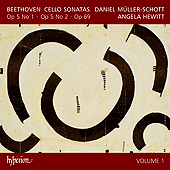
ESSENTIAL RECORDINGS

Beethoven set a precedent when he composed his first Sonatas for Piano and Cello, as he called them, because prior to their arrival, the cello always played a supportive role in chamber music, always playing the bass line and backing the soloist, or simply providing the under-pinning to the work at hand. Within these compositions, the cello was made to be on equal footing with the piano, and even lead the way in some instances, but these are definitely pieces for Cello and Piano as a pair, and not as a soloist with accompaniment.
The first two sonatas, the Sonata in F major, Op. 5 No. 1, and the Sonata in G minor, Op. 5 No. 2, take their cue from Haydn and Mozart in structure and layout, but already, with some dark and stormy moments, fast and expressive arpeggios on the piano, deep growls or tender lines on the cello, foretell the Beethoven that was to be. And of course, the Sonata in A major, Op. 69 is just that. Written in 1808, it is mature Beethoven, from around the same time as the 6th Symphony. It is at times heroic, defiant, noble, even bold, with long and expansive melodic lines in both the cello and the piano. The fast movements are wilder and more rhythmically adventurous, while the slow movement is less concerned with form than with emotional expression. Beethoven as only he can be.
Let me say that this music "fits" Daniel Müller-Schott and Angela Hewitt as a duo, much better than their previous recording together. Müller-Schott's playing and temperament agrees very well with Beethoven's character and bold expressive outbursts. Beethoven, as a composer, is one of the best examples of perfect combination between intellect and emotion, and in this fine recording, with her disciplined and logical playing, Hewitt is the brain, whilst Müller-Schott is the heart and soul. A perfect match for this type of repertoire. They both play with an exact sense of classical poise, perfectly counter-balanced by romantic turmoil.
It goes without saying that Hyperion have again managed to capture the perfect balance between both instruments, while producing the right ambience for this type of music. Looking forward to Volume 2.
Jean-Yves Duperron